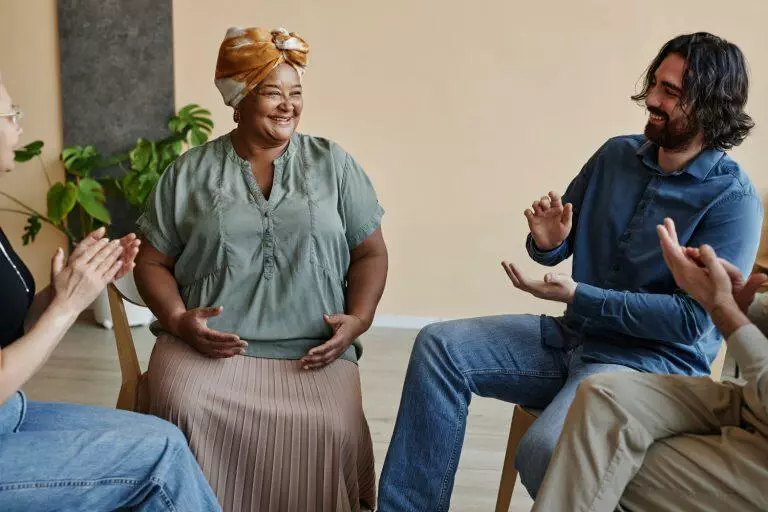In the last several decades, therapy has evolved to encompass a broad range of practices. No longer is it confined to a dialogue-based interaction between you and a therapist in an office setting.
For those who aren’t having success with traditional methods, experiential therapy could be an effective alternative. Through activities, expressive tools, and other methods, this approach enables you to revisit and explore critical life situations.
Many studies show experiential therapies can be effective treatments for myriad conditions, including psychiatric disorders and addiction.
At Maui Recovery, we’ve witnessed the incredible power of experiential therapy firsthand, and view it as a vital component of long-term recovery.
How does experiential therapy work?
Experiential therapy operates on the premise that your perception influences behavior. By revisiting repressed negative thoughts and emotions, you can learn positive emotions such as forgiveness, love, and peace, leading to a transformed perception of reality.
The therapy begins with seemingly unrelated tasks, during which you express your thoughts and feelings, gradually becoming aware of previously hidden emotions linked to past traumas. Your therapist actively guides you through activities, facilitating deeper insights and healing.
Below are some of the benefits of this approach:
Deep emotional engagement
It has the potential to evoke a unique emotional intensity, enabling a deeper level of emotional exploration and understanding.
Minimizing avoidance
Encourages confronting rather than avoiding challenging situations, thoughts, or conversations. It can help you to manage and decrease patterns of avoidance, promoting healthier responses to difficult experiences.
Navigating complex situations
Aids in revisiting and comprehending past traumatic or confrontational scenarios. It can be extremely helpful in allowing you to let go of lingering negative emotions, fostering healing and resolution.
Shifting perspectives
Through techniques like psychodrama, experiential therapy provides an opportunity to understand a situation from other people’s perspectives, fostering empathy and insight into their motivations. Over time, this process can foster acceptance, forgiveness, growth, and compassion.
Expressive therapeutic methods
Artistic modes of experiential therapy such as music, art, and drama therapy facilitate creative expression. These can be powerfully cathartic and offer alternative mediums for self-expression and emotional processing.
Experiential therapy vs traditional models

Every person is different—what works for you may not work for someone else. There’s no question that talk therapy has earned its place as a viable form of addiction and mental health treatment. However, for many reasons, certain people struggle within traditional settings. Experiential therapy can offer alternative techniques and environments that often succeed where other modalities have failed.
Accessibility
Traditional therapy models largely rely on verbal communication and cognitive understanding. This can pose a challenge for those who struggle with articulating their feelings, or those who may not yet fully comprehend their emotions. For example, younger people, or those with communication difficulties, may not be able to effectively benefit from these traditional methods.
Conversely, experiential therapy employs a more tactile and engaging approach, often involving activities or role-plays that can be more universally understood and accessed. This approach can aid in circumventing any existing verbal or cognitive barriers, providing a therapeutic medium that’s accessible to a broader population.
Engagement
Traditional therapies often rely on a person’s ability to actively engage in introspection and conversation. However, some people may find it difficult to open up or may be unwilling to confront or discuss their traumatic experiences directly.
Experiential therapy offers an indirect method of accessing these emotions via physical and emotional engagement in a range of activities. We’ve seen that clients often don’t realize they’re working through their emotions until after the activity, which can make the process feel less intimidating and more engaging.
Coping skill acquisition
Traditional therapy models typically teach coping mechanisms through discussion and advice, leaving the practical application up to you outside of the therapy session.
In comparison, experiential therapy provides a real-time, hands-on environment to learn and practice these skills. It allows you to immediately apply and refine these techniques under the guidance of the therapist, resulting in more effective learning and better retention of coping strategies.
Unconscious processing
Traditional models can struggle with reaching repressed or denied emotions, as they rely heavily on the conscious articulation of feelings and memories.
Experiential therapy, on the other hand, can bypass conscious defenses through activities that stimulate unconscious processes. This allows you to tap into hidden or suppressed emotions, leading to breakthroughs that might not be possible in more conventional therapeutic settings.
What can experiential therapy treat?

Experiential therapy can be effective in managing various mental health conditions and life issues, including trauma, eating disorders, behavioral issues, anger, grief, and loss. While it often forms a critical part of addiction treatment strategies, it isn’t just for those with diagnosed conditions. For example, if you’re wrestling with negative emotions stemming from past experiences, or if you want to enhance the quality of your existing and prospective relationships, experiential therapy could be your answer.
Experiential therapy typically works in tandem with other traditional talk therapy styles, though specific types can also be used independently.
Below are some of the conditions experiential therapy can help treat:
- Trauma and Post-Traumatic Stress Disorder (PTSD)
- Eating disorders like Anorexia, Bulimia, and Binge Eating Disorder
- Behavioral disorders, such as Oppositional Defiant Disorder (ODD) and Conduct Disorder
- Substance abuse and addiction
- Anxiety disorders, including Generalized Anxiety Disorder (GAD), Panic Disorder, and Social Anxiety Disorder
- Depression and Mood Disorders
- Personality disorders, such as Borderline Personality Disorder (BPD) and Narcissistic Personality Disorder (NPD)
- Issues related to anger management
- Grief and loss
- Self-esteem and confidence issues
- Relationship problems and interpersonal conflict
- Stress management
Types of experiential therapy
Experiential therapy covers a broad spectrum so there’s likely to be a preferred treatment for everyone. Below are a few of the most popular forms:
Psychodrama
Often combined with other forms of experiential therapy, psychodrama encompasses group dynamics, role-playing, and dramatic self-presentation.
This therapeutic “play” transports past situations into the present, offering an environment that safely straddles the line between reality and fantasy, allowing for an active exploration and reinvention of responses.
Through repeated enactments, you’re able to develop more adaptive reactions to these situations. The carefully established boundaries within psychodrama, such as a defined “stage” area, facilitate a clear understanding between the actual and the enacted, further promoting effective emotional processing and growth.
Equine therapy

Engaging with horses through various activities facilitates the identification and discussion of behavior patterns, emotions, and thoughts under the guidance of a mental health professional. It also promotes compassion, empathy, and a capacity for love.
By cultivating your relationship with another sentient being, equine therapy can allow you to unlock previously inaccessible areas of your psyche, sometimes leading to a radial breakthrough.
Nature immersion therapy
Today, the innumerable health benefits of nature are widely acknowledged. By immersing you in outdoor environments and organizing activities like hiking and camping, nature immersion therapy promotes mental, physical, and emotional wellbeing. Like music therapy, it aids you in exploring and coping with your emotions and thoughts related to mental health, trauma, and addiction.
Surf therapy

Harnessing the therapeutic power of the ocean, surf therapy promotes physical health, emotional wellbeing, and personal empowerment. Hawaii, (where Maui Recovery is based) serves as a perfect location for surf therapy, boasting an abundant coastline and consistent waves.
By learning to ride the waves, respect the power of the ocean, and work within a team, surf therapy encourages the exploration and understanding of emotions, thoughts, and behavior patterns.
Eye Movement Desensitization and Reprocessing (EMDR)
By visualizing traumatic events (in brief doses) and simultaneously undergoing specific eye movements directed by the therapist, EMDR can help individuals process traumatic memories, alleviating negative emotions and reducing the distress associated with them.
Art therapy

Through non-verbal communication via artistic expression – guided by an art therapist – individuals are able to effectively express, interpret, and process distressing emotions and negative thoughts in a more healthy and productive way. Techniques used in art therapy can include: working with clay, painting, photography, collage, sculpting, or coloring – depending on the issues you’re exploring and your own preferences.
Adventure therapy
Engaging in outdoor activities can foster improved communication skills, problem-solving abilities, personal responsibility, and trust among participants in a group setting. Whether hiking, canoeing, or snorkeling, Maui Recovery offers a variety of different adventure therapies as part of our personalized treatment plans.
Music therapy

Creating, moving to, singing along with, and listening to music under the guidance of a music therapist promotes mental, physical, and emotional wellbeing. Through the transcendental power of music, you’re provided a unique way to explore and cope with emotions related to mental health, trauma, and addiction.
How Maui Recovery can help
At Maui Recovery, we understand the profound impact and transformative power of experiential therapy. Our team of skilled and compassionate professionals has extensive expertise in integrating this innovative approach into personalized treatment plans, catering to the unique needs and challenges of each individual.
Our location, in the beautiful Hawaiian islands, provides an ideal setting to engage in experiential therapy. Surrounded by the soothing sights and sounds of nature, you’re offered an unparalleled opportunity to explore your emotions, confront your fears, and build resilience.
With us, you’re not just confronting your struggles; you’re building a new perspective and understanding of self, immersed in the tranquility and beauty of Hawaii. As part of our Ohana, we’ll ensure you’re given the skills needed to build a healthier, more fulfilled life.
If you’d like to talk to one of our experts about our recovery programs, and how we incorporate experiential therapy, please contact us today.









